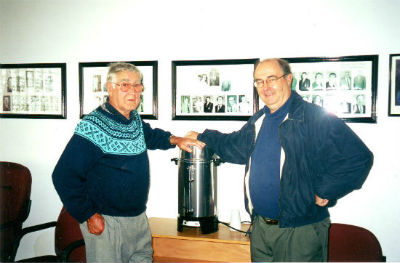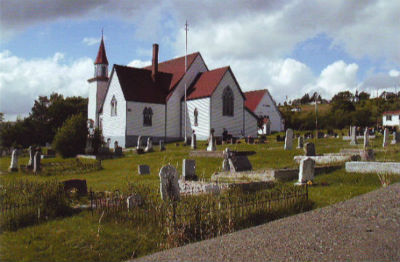An Anglican In Deed
George Earle is remembered
Submitted by Neil Earle
 George W. Earle (1922-2014) and author in a place
George knew well – Carbonear Council Chamber. The mementoes on the wall of
former town councils he freely donated.
George W. Earle (1922-2014) and author in a place
George knew well – Carbonear Council Chamber. The mementoes on the wall of
former town councils he freely donated.“Jesus Saviour pilot me, over life's tempestuous sea”
Beautiful for location, St. James Anglican Church in Carbonear stands with its neo-Gothic roof and stately bell tower as an almost pointed rebuke to the agnosticism of our age. The grand old church is celebrating its 150th anniversary this year which makes it three years older than the nation of Canada. How wonderful!
On Saturday, October 25, the elegant interior of St. James Anglican hosted some 200 people who had come to pay their respects to my father, George W. Earle, former town mayor, activist and booster and – unknown to many – a quiet supporter of his church across his whole life.
A full-page article in the hometown Carbonear Compass of January 20, 2007 evoked biblical language by paying tribute to him as “Salt of the Earth,” and commented: “He has to his credit having a hand in helping build two hospitals, a school (St. James Anglican High School – since renamed) and helping refurbish a parish hall. All of this was done at a time when one had to scramble as best one could to make a living.”
 Venerable St. James Anglican Church dominates the
hill overlooking the town. It is 150 years old this year and still used regularly.
Venerable St. James Anglican Church dominates the
hill overlooking the town. It is 150 years old this year and still used regularly.George Earle was my father. So this I know: He was in his glory on the open water. He began to build boats in the 1980s to the tune of one a year which led to him and his best friend, Eph Laing, plying the waters around Carbonear and Bristol's Hope in search of the wily cod. He began his working life as a stationer on the Labrador coast with his father Thomas J Earle who has the distinction of being buried nearest the steps on the south entrance to St. James Anglican. Yes, close to the action! Proper thing, for Tom and Jessie gave birth not only to a future mayor but to Helen Earle as well whose life as an unforgettable Anglican was detailed in the Newfoundland Churchman of 2001, a woman whose churchly career in support of a host of recotrs, included an award from her bishop for 60 years service in St. James' choir.
George and Helen were two of a kind. Generous, salty, energetic, always found with something in their hands, it seemed. George would recall many stories of small-town life and the impact of being part of that Anglican parish. At St. James Anglican he came early under the tutelage of the near-legendary cleric, Canon E. E. Rusted, who was spoken of in respectful terms when I was growing up. Once, when praying with dad a few years ago he confessed that, even though not a regular attendee, he recited the Lord's Prayer and the Apostles Creed every night before he went to bed.
“The Apostles Creed as well,” I replied. “My parishioners can't do that. Canon Rusted's influence, eh?” He msiled, “Yes, boy, that and the CLB.”
George came into his own as a fistherman. In 1949 he jiffed the largest codfish ever caught by hook and line. The was off the family plantation at Spear Harbour, Labrador. The cod measured 5' 11½" and weighted 157 pounds. He had the picture to prove it and distributed copies to most people he met in later years. No wonder. The recored stood for 50 years.
One of his classmates at the old St. James High School was Dr. Ian Rusted, son of the esteemed Canon and the brother of Nigel, first doctor on the old coastal steamer S.S. Kyle. Dr. Rusted lived on to help set up Memorial University's medical school while his brother Edward served 18 years as a missionary to North Borneo. Anglicans in action! Such useful lives emanating from old St. James Parish! A touch of that “muscular Christianity” of a Victorian period so many sanctuaries around Conception Bay connote still. Thus George W. Earle's penchant for public service was in the air all around him growing up. He was not only surrounded by Rusteds but his principal was the respected Stephen Russell who later became Carbonear's first mayor.
George had spurts of church attendance in the 1950s but for complicated reasons began to drift away from regular meetings. Yet the St. James drama team and the Roman Catholic neighbors at St. Clare's school had no hesitation for enlisting him in their many “Christmas Concerts” in the 1950s, a staple of the decades before “Entertainment Tonight.” One of my father's prized possessions was a certificate from the local Catholic prelate thanking him for his artistic services in the 1940s and 1950s.
You can see from all this what a rounded personality my father was. But he was more than an entertainer. It was a tribute to his deep internalized and abiding Anglicanism and standing among the faithful that the local rector called on dad to straighten out some book-keeping irregularities in 1963 and then asked him to serve on the Building Committee that helped build the fine new St. James High School soon after. Helen and I taught there in the summer of 1965 and the sturdy building still stands. Even into his seventies dad stayed busy adding some refurbishing touches to the new Anglican parish hall orchestrated by the dynamic Reverend Bob Rowlands in the 1990s, a hall that has been a real godsend to the congregation ever since.
How well I remember my father filling out his offering envelopes to give me every time I was home on a visit and worshipped again at old St. James. At these meetings in the 1990s my aunt Helen sang in the choir of course, but wait – my mom, Frances Earle, a welcome convert from the United Church down the road, was playing the organ. Dad diligently supported my mom's thirty-five years of dedicated service to St. James as he drove her to church every Sunday through storm and tempest. An Anglican, if unawares.
The tributes that poured in to celebrate my father's life as mayor, honorary fireman, Lion's Club executive secretary, hospital board member in October, 2014 rightly cited his contributions to the town – a “Carbonear legend,” he was called – but his quiet Anglicanism obviously shaped his early life and lived on till the end of his days. An Anglican in deed.
(Carobonear-born Neil Earle is a church pastor in Los Angeles and an instructor in church history with Grace Communion Seminary. This article originally appeared in the December 2014 issue of Anglican Life.)